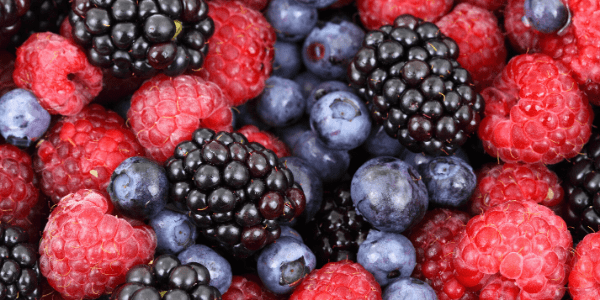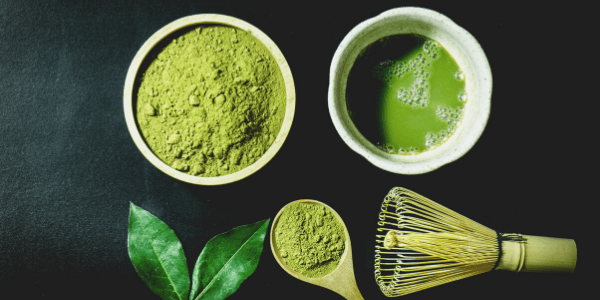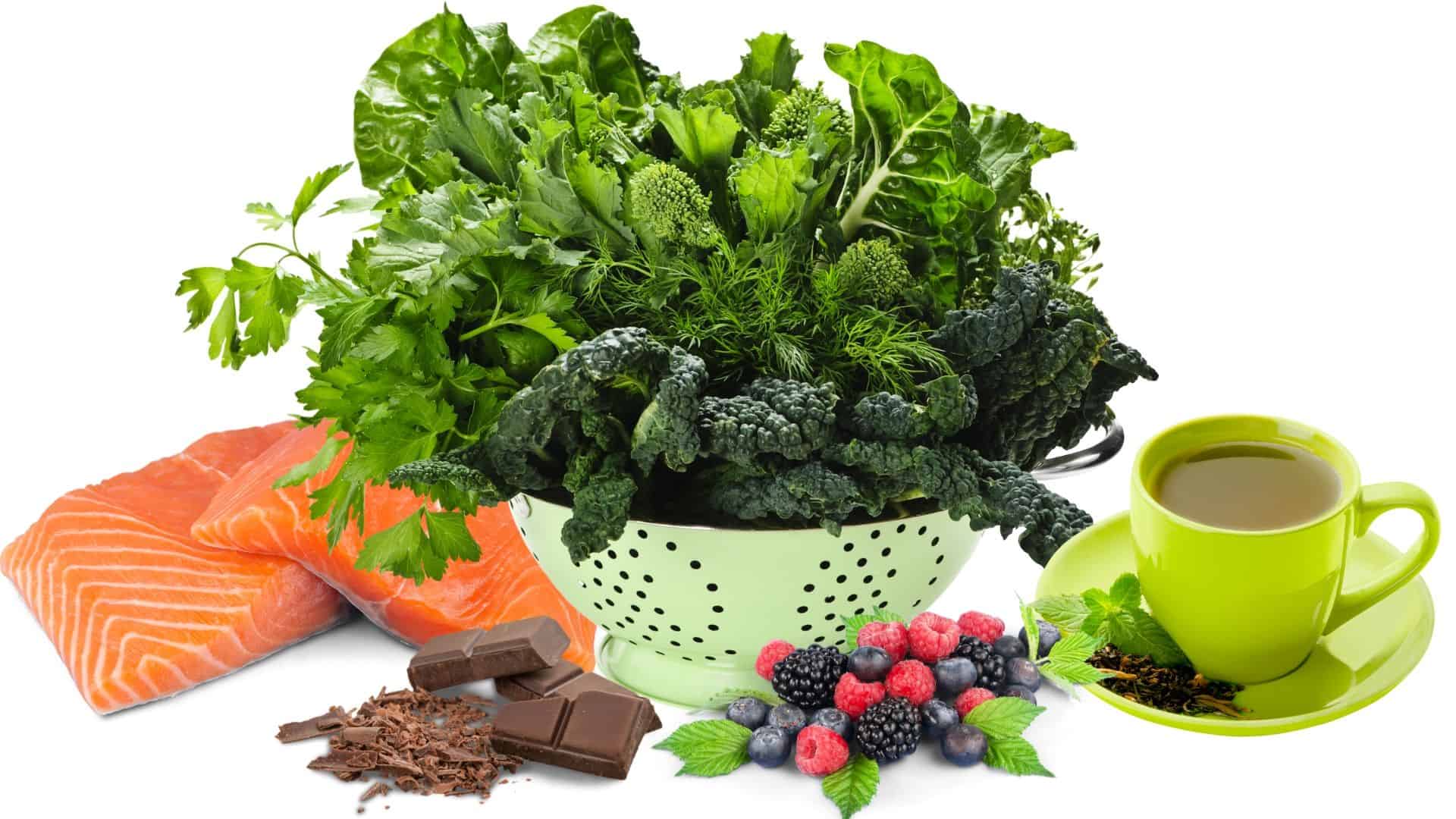When it comes to eating, not all foods are created equal. In particular, when it comes to eating to reduce the risk of cardiovascular disease, there are clear winners and losers. As we try to bring attention to cardiovascular health and what we can to reduce our risk of cardiovascular disease during heart health month, we are taking a closer look at heart healthy foods and those foods to avoid.
Heart disease affects approximately 2.4 million Canadian adults, and is the second leading cause of death in Canada. The current body of evidence shows that a diet high in fiber, antioxidants, vitamins, minerals, polyphenols, monounsaturated, and polyunsaturated fatty acids and low in salt, refined sugar, saturated, and trans fats are healthy and supportive of our heart (1).
In more general terms, this translates to a high intake of fruits, vegetables, legumes, fish and seafood, nuts, seeds, whole grains, and vegetable oils (mainly, extra virgin olive oil). To be more specific, here we zone in on the top 5 heart healthy foods to include in your diet to help support cardiovascular health!
Nutrition for a Healthy Heart
1. Dark Leafy Green Vegetables

Leafy green vegetables like spinach, kale and collard greens are a great source of vitamin K, which helps protect your arteries and promote proper blood clotting (2). They’re also high in dietary nitrates, which have been shown to reduce blood pressure, decrease arterial stiffness and improve the function of cells lining the blood vessels (3).
One analysis of eight studies found that increasing leafy green vegetable intake was associated with up to a 16% lower incidence of heart disease (4). Another study in 29,689 women showed that a high intake of leafy green vegetables was linked to a significantly lower risk of coronary heart disease (5).
To get your greens in your diet eat lots of salads, incorporate spinach in your morning omelet, and dark leafy greens in your smoothies.
2. Berries

You can’t go wrong with natures equivalent to candy – berries. Strawberries, blueberries, blackberries and raspberries are jam-packed with important nutrients that play a central role in heart health.
Berries are also rich in antioxidants like anthocyanins, which protect against the oxidative stress and inflammation. They are also high in fiber which helps to support healthy blood sugar levels both of which can help reduce the development of heart disease (6).
One study found that eating blueberries daily improved the function of cells that line the blood vessels, which help control blood pressure and blood clotting (7).
Additionally, an analysis of 22 studies showed that eating berries was associated with reductions in “bad” LDL cholesterol, systolic blood pressure, body mass index and certain markers of inflammation (8).
Eat your berries on salads, in your yoghurts or oatmeal, in smoothies, or on their own… you can’t go wrong!
3. Fatty Fish and Fish Oil

Fatty fish such as salmon, mackerel, sardines and tuna are loaded with omega-3 fatty acids, which have been studied extensively for their heart-health benefits.
The American Heart Association recommends eating 2 servings of fish (particularly fatty fish) per week. A serving is 3.5 ounce cooked, or about ¾ cup of flaked fish.
Interestingly enough each 3.5-ounce (100-gram) decrease in weekly fish consumption was associated with a 19% higher likelihood of having one additional risk factor for heart disease, such as high blood pressure, diabetes or obesity (9).
Another study showed that eating fish over the long term was linked to lower levels of total cholesterol, blood triglycerides, fasting blood sugar and systolic blood pressure.
However, there is one catch you need to avoid eating those fish with the potential for the highest level of mercury contamination (such as shark, swordfish, king mackerel or tilefish). Eat a variety of fish and shellfish that are lower in mercury (such as canned light tuna, salmon, pollock, and catfish).
4. Dark Chocolate

Dark chocolate is rich in antioxidants like flavonoids, which can help boost heart health and a lower risk of heart disease.
For all the chocolate lovers out there, you will be pleased to know that one large study showed that those who ate chocolate at least five times per week had a 57% lower risk of coronary heart disease than non-chocolate eaters (10).
Another study found that eating chocolate at least twice per week was associated with a 32% lower risk of having calcified plaque in the arteries (11).
In addition to having antioxidant qualities, the Cleveland Clinic indicates that flavanols found in cocoa and chocolate have other potential influences on vascular health, such as lowering blood pressure, improving blood flow to the brain and heart, and making blood platelets less sticky and able to clot.
It is important to point out that these studies were not based on candy bars that are filled with sugars and other artificial flavourings, preservatives or colourings but dark chocolate. So be sure to pick a high-quality, dark chocolate with a cocoa content of at least 70%, and moderate your intake to make the most of its heart-healthy benefits.
5. Green Tea

Green tea is filled with polyphenols and catechins, which can act as antioxidants to prevent cell damage, reduce inflammation and protect the health of your heart. It also has fat burning properties and has a calming effect on the nervous system.
According to one review of 20 studies, a higher intake of green tea catechins was associated with significantly lower levels of LDL and total cholesterol (12).
What’s more, an analysis including 1,367 people showed that green tea decreased both systolic and diastolic blood pressure (13).
Another small study found that taking green tea extract for three months reduced blood pressure, triglycerides, LDL and total cholesterol, compared to a placebo (14).
So switch out that coffee for your greet tea and your heart will love you for it!
Foods to Avoid for a Healthier Heart
1. Trans fats
Almost all trans fast are man made fats and are created to increase the shelf life of foods. They have no nutritional value or purpose. Research shows that trans fats can increase your risk of developing CVD as they increase LDL cholesterol and decrease HDL cholesterol.
The good news is that Health Canada has banned artificial trans fat, making it illegal for manufacturers to add partially hydrogenated oils to foods sold in Canada. This ban is being phased in and as of September 2020 all artificially produced trans fat will be removed from the food supply…. Yippee!!
Trans fats can be found in commercially baked and fried foods made with vegetable shortening, such as fries and donuts. It’s also in hard stick margarine and shortening and some snack and convenience foods. When you see “partially hydrogenated oils” on the label of a processed food, that means it contains trans fats.
2. Sugar
Research shows that a higher intake of sugars is associated with modestly higher blood lipids triglycerides, total cholesterol, LDL cholesterol, HDL cholesterol and was associated with modestly higher diastolic blood pressure (15).
Research shows that participants who took in 25% or more of their daily calories as sugar were more than twice as likely to die from heart disease as those whose diets included less than 10% added sugar.
Overall, the odds of dying from heart disease rose in tandem with the percentage of sugar in the diet—and that was true regardless of a person’s age, sex, physical activity level, and body-mass index (a measure of weight) (16).
Sugar-sweetened beverages such as sodas, energy drinks, and sports drinks are by far the biggest sources of added sugar in the average North American’s diet. They account for more than one-third of the added sugar we consume as a nation. Other important sources include cookies, cakes, pastries, and similar treats; fruit drinks; ice cream, frozen yogurt and the like; candy; and ready-to-eat cereals.
One can of coke as a whopping 10 teaspoons of sugar! So, switch out your pop, sports drinks and energy drinks for sparkling water or stevia sweetened pop, low sugar coconut water, herbal teas or just good old-fashioned water.
Make those changes now and your heart will love you for it!
We can all reduce our risk of heart disease by making healthy lifestyle choices, including quitting smoking, getting enough sleep, exercising regularly, monitoring blood pressure and cholesterol levels and of course eating a balanced diet full of heart healthy foods.
If you have questions about eating for heart health or other nutrition questions, please feel free to contact me or my team at Koru Nutrition.
Written by guest blogger
CONNECT WITH KYLIE!
OUR LOCATIONS
FOLLOW US!
OUR SERVICES
References
[1]59 Int J Mol Sci. 2018 Dec; 19(12): 3988. Published online 2018 Dec 11. doi: 10.3390/ijms19123988 PMCID: PMC6320919 PMID: 30544955 Nutrition and Cardiovascular Health Rosa Casas,1,2Sara Castro-Barquero,1Ramon Estruch,1,2 and Emilio Sacanella1,2,*
[2]Integr Med (Encinitas). 2015 Feb; 14(1): 34–39. PMCID: PMC4566462 PMID: 26770129 Proper Calcium Use: Vitamin K2as a Promoter of Bone and Cardiovascular Health Katarzyna Maresz, PhD
[3]Hypertension. 2015 Feb; 65(2): 320–327. Published online 2014 Nov 4. doi: 10.1161/HYPERTENSIONAHA.114.04675 Dietary nitrate provides sustained blood pressure lowering in hypertensive patients: a randomized, phase 2, double-blind, placebo-controlled study Vikas Kapil,1Rayomand S Khambata,1Amy Robertson,1 Mark J Caulfield,1 and Prof Amrita Ahluwalia1,*
[4]JRSM Cardiovasc Dis. 2016 Jan-Dec; 5: 2048004016661435. Published online 2016 Aug 1. doi: 10.1177/2048004016661435 PMCID: PMC4973479 PMID: 27540481 The effect of green leafy and cruciferous vegetable intake on the incidence of cardiovascular disease: A meta-analysis Richard Lee Pollock
[5]Am J Clin Nutr.2011 Feb;93(2):275-83. doi: 10.3945/ajcn.110.000521. Epub 2010 Dec 22. Fruit, vegetables, and olive oil and risk of coronary heart disease in Italian women: the EPICOR Study. Bendinelli B1, Masala G, Saieva C, Salvini S, Calonico C, Sacerdote C, Agnoli C, Grioni S, Frasca G, Mattiello A, Chiodini P, Tumino R, Vineis P, Palli D, Panico
[6]Mol Nutr Food Res.2007 Jun;51(6):675-83. Berry anthocyanins as novel antioxidants in human health and disease prevention. Zafra-Stone S1, Yasmin T, Bagchi M, Chatterjee A, Vinson JA, Bagchi D.
[7]Nutrients.2015 May 27;7(6):4107-23. doi: 10.3390/nu7064107. Blueberries improve endothelial function, but not blood pressure, in adults with metabolic syndrome: a randomized, double-blind, placebo-controlled clinical trial. Stull AJ1,2, Cash KC3, Champagne CM4, Gupta AK5, Boston R6, Beyl RA7, Johnson WD8,9, Cefalu WT10,11.
[8]Sci Rep. 2016; 6: 23625. Published online 2016 Mar 23. doi: 10.1038/srep23625 PMCID: PMC4804301 PMID: 27006201 Effects of Berries Consumption on Cardiovascular Risk Factors: A Meta-analysis with Trial Sequential Analysis of Randomized Controlled Trials Haohai Huang,a,1Guangzhao Chen,2Dan Liao,3 Yongkun Zhu,1 and Xiaoyan Xue1
[9]Med Sci Monit.2007 Jul;13(7):CR307-12. Long-term fish intake is associated with better lipid profile, arterial blood pressure, and blood glucose levels in elderly people from Mediterranean islands (MEDIS epidemiological study). Panagiotakos DB1, Zeimbekis A, Boutziouka V, Economou M, Kourlaba G, Toutouzas P, Polychronopoulos E.
[10]Clin Nutr.2011 Apr;30(2):182-7. doi: 10.1016/j.clnu.2010.08.005. Epub 2010 Sep 19. Chocolate consumption is inversely associated with prevalent coronary heart disease: the National Heart, Lung, and Blood Institute Family Heart Study. Djoussé L1, Hopkins PN, North KE, Pankow JS, Arnett DK, Ellison RC.
[11]Clin Nutr.2011 Feb;30(1):38-43. doi: 10.1016/j.clnu.2010.06.011. Epub 2010 Jul 22. Chocolate consumption is inversely associated with calcified atherosclerotic plaque in the coronary arteries: the NHLBI Family Heart Study. Djoussé L1, Hopkins PN, Arnett DK, Pankow JS, Borecki I, North KE, Curtis Ellison R.
[12]J Am Diet Assoc.2011 Nov;111(11):1720-9. doi: 10.1016/j.jada.2011.08.009. Green tea catechins decrease total and low-density lipoprotein cholesterol: a systematic review and meta-analysis. Kim A1, Chiu A, Barone MK, Avino D, Wang F, Coleman CI, Phung OJ.
[13]Sci Rep. 2014; 4: 6251. Published online 2014 Sep 1. doi: 10.1038/srep06251 Effect of green tea consumption on blood pressure: A meta-analysis of 13 randomized controlled trials Xiaoli Peng,1,2,3Rui Zhou,2,3Bin Wang,2 Xiaoping Yu,1 Xiaohong Yang,1 Kai Liu,a,2 and Mantian Mib,2
[14]Nutr Res. 2012 Jun;32(6):421-7. doi: 10.1016/j.nutres.2012.05.007. Epub 2012 Jun 20. Green tea extract reduces blood pressure, inflammatory biomarkers, and oxidative stress and improves parameters associated with insulin resistance in obese, hypertensive patients. Bogdanski P1, Suliburska J, Szulinska M, Stepien M, Pupek-Musialik D, Jablecka A.
[15]Te Morenga LA et al. Dietary sugars and cardiometabolic risk: systematic review and meta-analyses of randomized controlled trials of the effects on blood pressure and lipids–. AJCN. 2014;100(1):65-79.
[16] Added Sugar Intake and Cardiovascular Diseases Mortality Among US Adults Quanhe Yang, PhD1; Zefeng Zhang, MD, PhD1; Edward W. Gregg, PhD2; et alW. Dana Flanders, MD, ScD3; Robert Merritt, MA1; Frank B. Hu, MD, PhD4,5 JAMA Intern Med. 2014;174(4):516-524. doi:10.1001/jamainternmed.2013.13563
Last Updated on January 25, 2023 by Propel Physiotherapy









